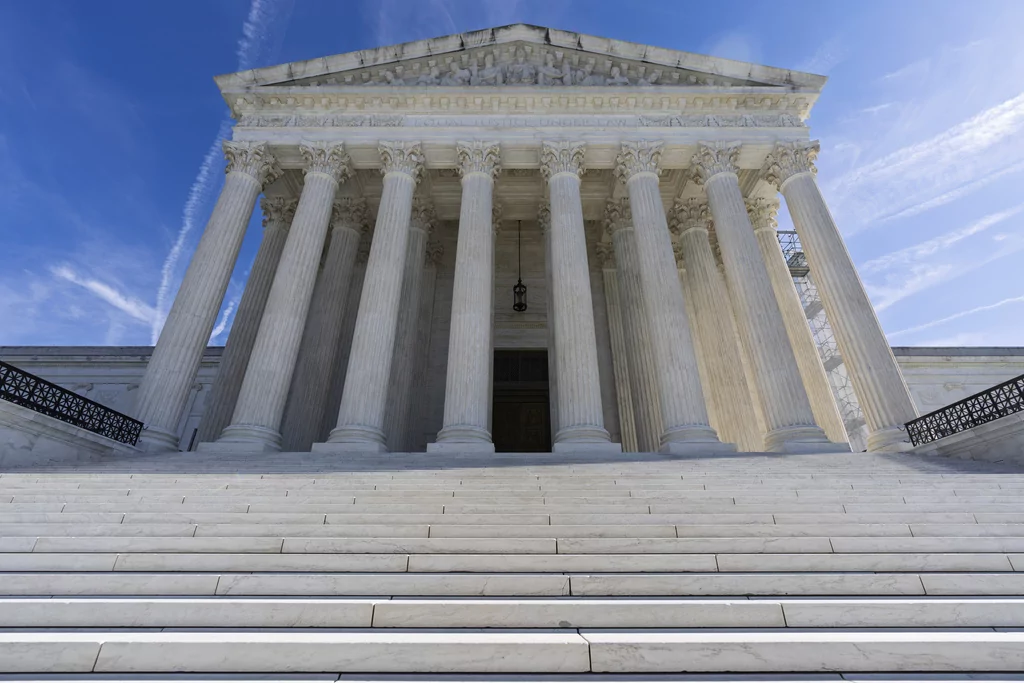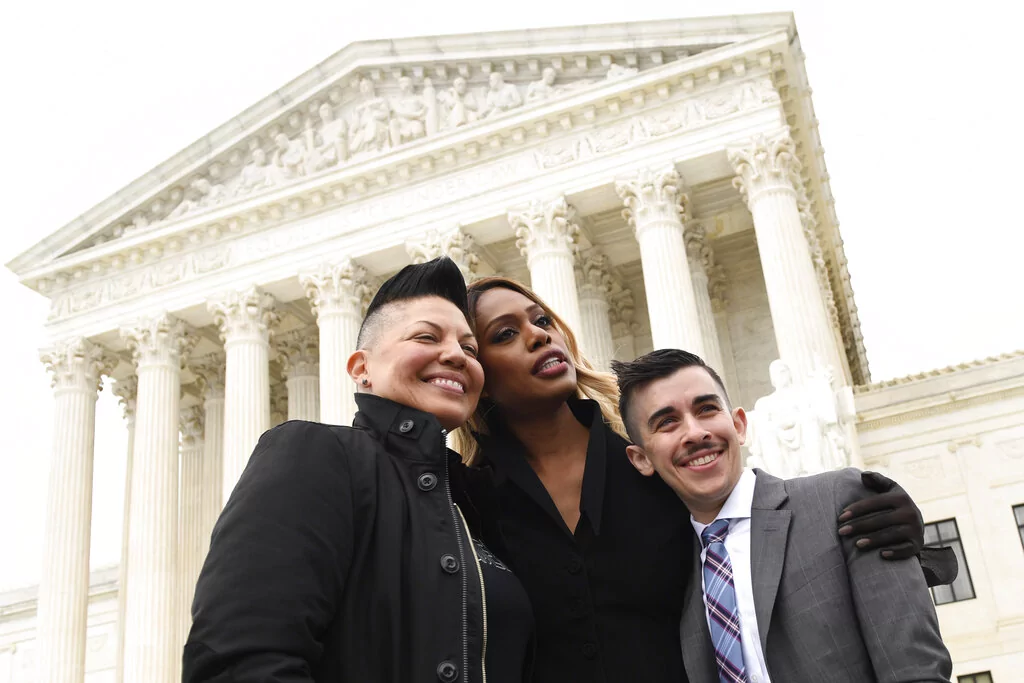
The Supreme Court will soon hear arguments in a landmark case that could set a pivotal precedent on states’ authority to regulate transgender hormone therapy procedures for minors.
At the heart of the set for oral arguments Wednesday is whether Tennessee’s Senate Bill 1 (SB1), a law barring puberty blockers, cross-sex hormones, and surgeries for minors, violates the Equal Protection Clause of the 14th Amendment.
While Republican lawmakers, including incoming President-elect Donald Trump, have sounded alarms about matters of fairness surrounding biological men competing on female sports teams, a larger underbelly of concern is brewing over the more than 14,000 minors who have undergone transgender-related procedures since 2019.
SB1 is “a law that is directed at children and at protecting children from the irreversible effects of some very serious procedures,” Tennessee Attorney General Jonathan Skrmetti told the Washington Examiner in early October.

The case was initially brought by the American Civil Liberties Union and other top law firms in defense of “families with transgender adolescents,” according to a press release from the ACLU. President Joe Biden’s Justice Department intervened in the case after a federal appeals court upheld Tennessee’s law, asking the Supreme Court to take up the dispute.
Oral arguments at the high court on Dec. 4 will represent one of the most significant constitutional debates, marking the first time the justices will weigh in on the legality of bans targeting transgender procedures for minors. Meanwhile, advocates of protecting children, as well as pro-transgender activists, are preparing to rally at the Supreme Court as early as Tuesday.
Here is what you need to know before oral arguments commence at the Supreme Court on Wednesday at 10 a.m. EST.
The core constitutional question
The justices are tasked to decide whether SB1 unlawfully discriminates under the Fourteenth Amendment or constitutes a legitimate exercise of state authority to protect minors from medically and scientifically uncertain procedures.
Tennessee argues the law is rooted in valid medical and age-based distinctions, not invidious discrimination, while challengers at the ACLU contend it violates equal protection by singling out minors who contend they want to change their gender.
This case invites the Supreme Court to clarify the boundaries of state power in regulating contentious medical practices, much as it did in Dobbs v. Jackson Women’s Health Organization, which overturned Roe v. Wade. The outcome will have far-reaching implications not only for Tennessee but also for more than 20 other states with similar laws on the books.
Legal and scientific debate
Tennessee’s SB1 prohibits medical interventions intended to allow “a minor to identify with, or live as, a purported identity inconsistent with the minor’s sex” or to treat “purported discomfort or distress from a discordance between the minor’s sex and asserted identity,” according to the text of the statute.
While the law’s prohibitions outlaw invasive surgeries for minors, the ACLU’s dispute focused more narrowly on the prohibition of puberty blockers for minors, arguing the 14th Amendment’s equal protection clause is implicated because it does not prohibit such medicines for minors facing other ailments besides gender dysphoria.
The U.S. Court of Appeals for the 6th Circuit upheld the law, with Chief Judge Jeffrey Sutton finding that SB1 “treats similarly situated individuals evenhandedly” and does not trigger heightened constitutional scrutiny. However, the challengers have emphasized the Biden administration’s support for heightened review under the reasoning of Bostock v. Clayton County (2020), which extended Title VII protections to gender identity.
Christopher Green, a professor at the Mississippi College School of Law, contends that the justices could take a novel approach to the equal protection clause or a viewpoint that it functions to protect people and property from violence, not discrimination. Green was cited by Justice Clarence Thomas in a 2022 14th Amendment case over gerrymandering in South Carolina
“So under that view, really what the court should be doing in all these antidiscrimination cases is looking — instead of at the equal protection — looking at ‘citizenship,’ and ‘equal citizenship’ in particular,” Green said.
The case comes to the high court amid growing concerns over the safety and efficacy of medical interventions for minors. Puberty blockers and cross-sex hormones, according to Tennessee and its supporters, carry risks of irreversible harm, including diminished bone density, fertility problems, and increased risks of cancer and cerebrovascular disease.
Conflicting medical perspectives
The medical community in the United States remains divided on the use of gender-transition treatments for minors, with more and more doctors now speaking up about the irreversible consequences of these hormone-altering drugs.
Dr. Jared Ross, a senior fellow at the nonprofit organization Do No Harm, highlighted these risks in an interview with the Washington Examiner, describing the emotional pressures parents and guardians face to agree to transitioning their children.
“These are desperate parents looking for answers, and this is often sold as a silver bullet … We know this path starts with social transition, moves to puberty blockers — promoted as safe and reversible — and eventually leads to irreversible surgeries. But we know these claims are not true,” Ross said.
Critics of SB1 say the law rejects a supposed “medical consensus” that supports these interventions.
However, Skrmetti’s office argues in court filings that this so-called consensus is politically driven, pointing to a doubling of transgender-identifying minors from 0.7% to 1.4% in recent years while adult rates have remained constant.
Tennessee has garnered robust support, with dozens of amicus briefs filed in favor of the law, including one signed by 56 physicians from various specialties, including Ross. Nearly 14,000 minors received transgender-related treatments between 2019 and 2023, including nearly 6,000 surgeries, according to data cited in DNH’s brief.
Many of the briefs supporting Tennessee say the state’s law echoes policy shifts in European nations, including Sweden and Finland, which have tightened restrictions on medical interventions for minors amid concerns over long-term consequences. Those pro-Tennessee briefs also raise flags about groups such as the World Professional Association for Transgender Health, which utilize their questionable studies to push the notion that minor transition procedures are “medically necessary” for survival.
Europe’s decision to pump the brakes on these expanding medical sciences coincides with a rising number of detransitioners, individuals who regret or reverse gender-transition procedures, are increasingly speaking out about the irreversible effects of these treatments, further fueling the debate.
“We’ve seen a growing number of detransitioners who start to speak out about being pressured into these procedures and about the damage that these procedures have done to their bodies, irreversible damage, in some cases,” said Skrmetti.
What to expect between oral arguments and a final ruling
The Skrmetti case will be argued by three main parties, including Tennessee Solicitor General James Rice, in favor of the law, while Solicitor General Elizabeth Prelogar and an ACLU attorney will share argument time against SB1.

Chase Strangio, a lawyer with the ACLU’s LGBT & HIV Rights Project, will present arguments on behalf of families that sued against SB1. Strangio, 42, is also a biological female who identifies as a man and is set to become the first transgender individual to argue before the nine justices.
Some legal experts have raised questions about what the justices will ultimately do if the incoming Trump administration reverses its legal position from the current Biden administration’s stance and begins to side with Tennessee’s law and what that will mean for their decision in the case. Ed Whelan, the Antonin Scalia chairman in Constitutional Studies at the Ethics and Public Policy Center, said an opinion from the late Justice Sandra Day O’Connor might offer clues to this question.
O’Connor’s writing in Director of Office of Workers’ Compensation Programs v. Perini North River Associates (1983) says once a case is “properly brought here, the case-or-controversy requirement can be satisfied even if the parties who are asserting their adverse interests before this Court are not formally aligned as adversaries,” Whelan cited in a recent National Review post, suggesting the Supreme Court here could likewise continue crafting their ruling.
While legal experts interviewed by the Washington Examiner were optimistic the majority on the Supreme Court is likely to uphold Tennessee’s law, they offered a variety of possible routes the justices could take when they issue a ruling sometime before June next year:
1. Affirmation of SB1: The Supreme Court could uphold the law, ruling it a constitutional exercise of state authority to protect minors.
2. Partial Ruling: Justices may find aspects of the law, such as bans on surgeries, constitutional while striking down restrictions on puberty blockers or hormones.
3. Complete Rejection: The Supreme Court could find the law to run afoul of the Constitution’s equal protection clause and remand it back to the district court to likely rule against SB1.
CLICK HERE TO READ MORE FROM THE WASHINGTON EXAMINER
If the decision is made on the merits of the case, it will resonate far beyond Tennessee. An affirmation of SB1 could encourage other states to implement similar bans, while a rejection could impose new constitutional limits on state regulation of transgender care.
Oral arguments can be livestreamed beginning at 10 a.m. EST Wednesday on the Supreme Court’s webpage.





